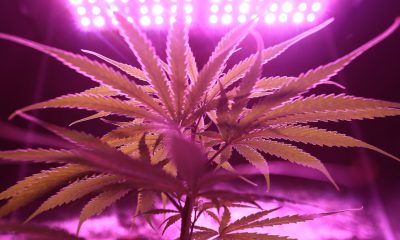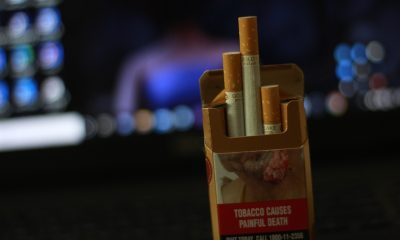Cannabis
The impact of legalization on underage cannabis use
Following the legalization of cannabis, young people in the USA do not consume more cannabis than before – but possibly even less. Ten US states have so far legalized cannabis for recreational purposes, and more than 30 states have approved cannabis for medical use. Since then, experts there have been particularly concerned: Is the re-evaluation of cannabis tempting more young people to use it?

In Germany, it is often easier for minors to obtain cannabis than cigarettes. Due to the legal market and the associated age controls, the consumption among minors can be prohibited almost universally. When it comes to cannabis, that is more difficult to do because of the lack of regulation. At this point, it is important to highlight the effect of legalization on the use of cannabis by minors. In order to do that, data and facts from the USA were consulted.
The Hemp.im mobile application was created to facilitate the search for information about cannabis from around the world. Our app is currently a global reference on the web for information about marijuana reports, medical uses, scientific research and much more.
The black market and the age test
In principle, the first step is to strictly regulate the distribution of cannabis. In the USA, in most states in which cannabis is legalized, it can be purchased from the age of 21. Customers have to show their ID at the entrance of the shop, in order to prove they are of legal age. Only then can they enter the shop. This alone prevents the sale to minors, as usually only the seller himself can be persuaded. For example, by using this method, the entire state of Oregon was able to prevent minors from getting hold of cannabis.
Nevertheless, the black market is still available. The distribution structures are still too present to be broken up immediately. Illegal products such as vaporizers or edibles are particularly problematic. Since the state no longer controls these products, dangerous products with sometimes toxic ingredients can also be sold.
Some legal cannabis companies sell their products on the black market
A critical problem is the sale of cannabis products, by legal companies, on the black market. Among other things, products that have not been publicly approved because they did not meet quality standards are smuggled into the black market. For example, in October 2019, an unlicensed production facility of a legal cannabis company was investigated.
Illegal products worth $21 million were seized. All these products turned out to be unlicensed and were intended to be smuggled into the black market. As a result, the company had its distribution license in California completely revoked.
Research on cannabis consumption in high-schools
Scientists from the journal “Jama Pediatrics” have been studying drug use in high schools, for over 20 years. They found that after cannabis was legalized in Washington State, 7.3% of eighth-graders have used cannabis, while before legalization, this figure was 9.8%. Among tenth-grade students, the percent also decreased from about 20% to 18%.
Even though these shifts are not earth-shattering, they make it clear that cannabis legalization limits consumption. The very fact that cannabis use is not increasing is surprising. The attraction of the illegal can be clearly observed in the case of cannabis.
The correct measures for the protection of minors
From the point of view of the protection of minors, some steps should now be taken. It has been proven that the consumption of cannabis decreases after legalization. For this reason alone, it is no longer possible to argue with the protection of minors if legalization is prohibited.
This adds to the fact that those who still use cannabis, receive it from the state. Intoxications or the bad influences of cannabis drug dealers are completely eliminated. Legalization, therefore, protects the youth.
__
(Featured image by Abdiel Ibarra via Unsplash)
DISCLAIMER: This article was written by a third party contributor and does not reflect the opinion of Born2Invest, its management, staff or its associates. Please review our disclaimer for more information.
This article may include forward-looking statements. These forward-looking statements generally are identified by the words “believe,” “project,” “estimate,” “become,” “plan,” “will,” and similar expressions. These forward-looking statements involve known and unknown risks as well as uncertainties, including those discussed in the following cautionary statements and elsewhere in this article and on this site. Although the Company may believe that its expectations are based on reasonable assumptions, the actual results that the Company may achieve may differ materially from any forward-looking statements, which reflect the opinions of the management of the Company only as of the date hereof. Additionally, please make sure to read these important disclosures.
First published in HANF MAGAZIN, a third-party contributor translated and adapted the article from the original. In case of discrepancy, the original will prevail.
Although we made reasonable efforts to provide accurate translations, some parts may be incorrect. Born2Invest assumes no responsibility for errors, omissions or ambiguities in the translations provided on this website. Any person or entity relying on translated content does so at their own risk. Born2Invest is not responsible for losses caused by such reliance on the accuracy or reliability of translated information. If you wish to report an error or inaccuracy in the translation, we encourage you to contact us.

-

 Fintech2 weeks ago
Fintech2 weeks agoDruo Doubles Processed Volume and Targets Global Expansion by 2026
-

 Business14 hours ago
Business14 hours agoDow Jones Stalls Near Record Highs as Inflation-Fueled Rally Awaits Next Move
-

 Business1 week ago
Business1 week agoTopRanked.io Weekly Affiliate Digest: What’s Hot in Affiliate Marketing [Health Trader Affiliate Program Review]
-

 Africa6 days ago
Africa6 days agoAir Algérie Expands African Partnerships























